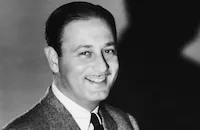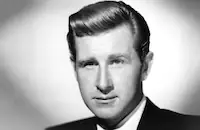Colt .45

Brief Synopsis
Cast & Crew
Edwin L. Marin
Randolph Scott
Ruth Roman
Zachary Scott
Lloyd Bridges
Alan Hale
Film Details
Technical Specs

Synopsis
While gun salesman Steve Farrell is demonstrating the new Colt .45 repeating pistols to a sheriff, prisoner Jason Brett, who is being transferred to another jail, manages to take the pistols and make his escape. The townspeople are convinced that Steve was Brett's partner and jail him. During the four months that Steve is jailed, Brett begins a long siege of theft and murder. Regular rifles and pistols are no match for his Colt .45 pistols. When Steve is finally released, the sheriff offers him a letter clearing him of the charges against him, providing he reveals Brett's hiding place. Steve, however, proclaims his innocence, and vows to get his guns back from Brett. Steve finds Brett's trail when he happens on a group of Indians whom Brett has killed to provide a cover for a stagecoach robbery. After Walking Bear, the sole survivor of the slaughter, tells Steve about Brett's plan, Steve boards the stage and fights off the attack with his own set of Colt .45s, despite the attempts of Beth Donovan, the only passenger on the stage, to prevent him. Unknown to Steve, Beth is the wife of Paul Donovan, one of Brett's associates. Later, Steve notices that a white scarf hung outside the stagecoach is being used as a signal and, sure that Beth is part of the gang, tries to bring her to the sheriff. Beth escapes and returns to camp. Although Beth believes that Paul has been forced to work with Brett, he is actually plotting with the bandit to take over the nearby town of Bonanza Creek. Sheriff Harris, who unknown to the town is allied with Brett, agrees to make Steve his deputy, but immediately reveals the fact to Brett, who then plans an ambush for Steve. Steve evades the ambush with the help of Walking Bear's fellow Indians. He captures two members of the gang and brings them back to town. At the hideout, Beth overhears Paul plotting with Brett and realizes her husband is actively working with the gang. After Beth denounces Paul, he locks her in a store room. Later, she manages to escape and hurries into town, planning to reveal everything to the authorities. Donovan stops Beth outside the town, and when she tries to ride past him, shoots her. Steve, hearing the shots, finds Beth lying on the ground and takes her with him to seek refuge with Walking Bear. Beth warns Steve about Paul and Brett's plan to take over Bonanza Creek. Then the Indians discover Donovan's body, shot in the back by a .45. After Steve learns that the Indians intend to go on the warpath, he tries to warn the town, but Brett's men trap and capture him. The Indians kill his captors, but Harris survives. While Steve and the Indians quietly kill many of Brett's men in town, Harris crawls back to warn Brett. Using Beth as a shield, Brett tries to escape, but Beth breaks away and the Indians taunt Brett into using all his powder. Steve then overcomes Brett and is rewarded with Beth's embrace.

Director

Edwin L. Marin
Cast

Randolph Scott

Ruth Roman

Zachary Scott

Lloyd Bridges

Alan Hale
Ian Macdonald
Chief Thundercloud
Luther Crockett
Walter Coy
Charles Evans
Stanley Andrews
Hal Taliaferro
Buddy Roosevelt
Art Miles
Barry Regan
Howard Negley
Charles Sherlock
Nolan Leary
Paul Newland
Franklyn Farnum
Ed Peil Sr.
Aurora Navarro
Jack Watt
Carl Andre
Royden E. Clark
Clyde Hudkins Jr.
Leroy Johnson
Ben Corbett
Kansas Moehring
Warren Fisk
Forrest R. Colee
Artie Ortego
Richard Brehm
Dick Hudkins
Leo Mcmahon
Bob Burrows
William Steele
Crew
Douglas Bacon
Harry Barndollar
Thomas Blackburn
Wilfrid M. Cline
Saul Elkins
Oren Haglund
Mitchell Kovaleski
William Lava
Frank Magee
Charles Maxwell
Dolph Thomas
William Wallace
Perc Westmore

Videos
Movie Clip


Hosted Intro
Film Details
Technical Specs

Articles
Colt .45
Colt .45 begins with gun salesman Steve Farrell (Randolph Scott) talking up the Colt .45 to the local sheriff, trying to impress him enough to sell him a couple when prisoner Jason Brett (Zachary Scott) punches the sheriff, grabs the pistols and shoots him dead. As he's leaving, the townspeople walk in and assume he was working with Farrell. Brett leaves town and begins a four month robbery and killing spree with his new Colt .45s, the best gun in the west and unmatched by anyone going up against him. Farrell, meanwhile, has been arrested and jailed as Brett's accomplice. Eventually, four months later, they let him go when the sheriff figures he must not be guilty since no one can come up with any evidence against him. This, by the way, doesn't seem to bother Farrell in the least. Without so much as a "hey, I've been wrongly imprisoned for four months, I've got a lawsuit I'd like you to meet" Farrell thanks the sheriff for letting him go and heads out to get those guns back. This, it should be stated, is pure Randolph Scott. His stoicism never lent itself to victimhood or whining. He simply endured.
Later, Farrell meets up with the gang trying to rob a stagecoach. He fights them off with his own set of Colt .45s and discovers the passenger in the stagecoach, Beth (Ruth Roman), is in cahoots with the gang. In fact, as it's discovered along the way, several different characters are in cahoots with several different bad guys and the plot ends up working as a series of plot twists even better than most thrillers.
One of the most interesting and enlightened elements of Colt .45 is its treatment of the Indian characters in the film, a positive treatment that nonetheless goes hand in hand with stereotypical appearance and behavior. Several demeaning images, including Indians pumping their hands over their mouths while they chant and covered in war paint whether they're in battle or not, appear in the film and, unfortunately, every word they utter is in painfully broken English, spoken in a slow, solemn style befitting the stereotype. The leader of the tribe, Walking Bear (Chief Thundercloud, aka, Victor Daniels) does most of that talking and it's difficult to watch. What's different is that, as characters, they are presented in an entirely positive light. They are welcomed by Scott as partners in his battle and end up being the real heroes of the movie. They play the good guys against white cowboys portrayed as the bad guys. Hollywood still had a long way to go in its treatment of Native Americans in the movies but Colt .45 made some baby steps in that direction.
Edwin L. Marin, no stranger to the western (directing John Wayne himself in Tall in the Saddle in 1944), directs Colt .45 with all the brisk energy brought to western serials of the day. No more than a few minutes of screen time ever pass without some kind of excitement, deceit or action. And the actors, great talents all, bring the story to life in ways that belie the movie's lower budget status. Talents like Lloyd Bridges or Alan Hale don't phone anything in, no matter what the budget, and Colt .45 is no exception.
Lloyd Bridges had been in movies for years before he came to notice in 1949s excellent Home of the Brave. In Colt .45 he plays the nice guy husband to Ruth Roman's Beth but he may not be as nice, or innocent, as he seems. Working with Brett but telling Beth he wants to leave, Bridges does a great job of playing both sides of the game until his true loyalties surface halfway through.
Alan Hale was nearing the end of his film career with Colt .45, his second to last movie before passing in January of 1950. His last film, Rogues of Sherwood Forest, fittingly saw him portray Little John one last time. In Colt .45 he plays a sheriff who, like so many of the other characters in the movie, may or may not be what he seems. Alan Hale, consummate nice guy and perennial buddy to the hero, turned out to have a real talent for playing duplicitous.
Zachary Scott, on the other hand, was born to play duplicitous and audiences loved him as the heavy. Scott's Brett is conniving, sniveling and devious from the beginning and gets no better as the movie progresses. In fact, he gets worse. Starting out as a convict stealing a couple of guns, he ends up with a plan to take over a town and gleefully convince said town to execute an innocent man, Farrell. It's the kind of role Scott relished and here he's definitely in his element.
Ruth Roman was just one year removed from her most famous role as Farley Granger's fiancé in Alfred Hitchcock's Strangers on a Train (1951) and plays a woman who must decide between doing the right thing and doing what she needs to do to get ahead. It's the kind of female role that didn't exist in westerns at the time, a genre always dominated by men. Having a female play a member of the gang was a big stretch for a western in 1950 and Roman made it work.
Naturally, Randolph Scott, the King of the Western, does his fine acting in the movie by not doing a lot of acting at all. By design, of course. Scott was smart enough to know that perfecting the character of the quiet but honorable loner didn't require, nor did it desire, a lot of emoting. It required stoicism and fortitude. Scott had those in spades. As a result, Colt .45 works from beginning to end and takes the kind of chances that only a B movie can take, flying as it were under the noses of the critical community. It presents its Native American characters as heroes and its female lead as a strong, courageous partner in justice and does so without apology. And Randolph Scott proved once again that when it comes to westerns, he has no equal.
Producer: Saul Elkins
Director: Edwin L. Marin
Screenplay: Thomas Blackburn
Cinematography: Wilfred M. Cline
Music: William Lava
Film Editor: Frank Magee
Art Direction: Douglas Bacon
Set Decoration: William Wallace
Cast: Randolph Scott (Steve Farrell), Ruth Roman (Beth Donovan), Zachary Scott (Jason Brett), Lloyd Bridges (Paul Donovan), Alan Hale (Sheriff Harris), Ian MacDonald (Miller), Chief Thundercloud, aka, Victor Daniels (Walking Bear).
C-74m.
by Greg Ferrara

Colt .45
Quotes
Trivia
Notes
The film begins with the following written foreword: "A gun like any other source of power, is a force for either good or evil, being neither in itself, but dependent upon those who possess it." This was the last film that well-known character actor Alan Hale (1892-1950) made before his death, although the 1950 Columbia film Rogues of Sherwood Forest, which was filmed prior to Colt .45, was released later.















